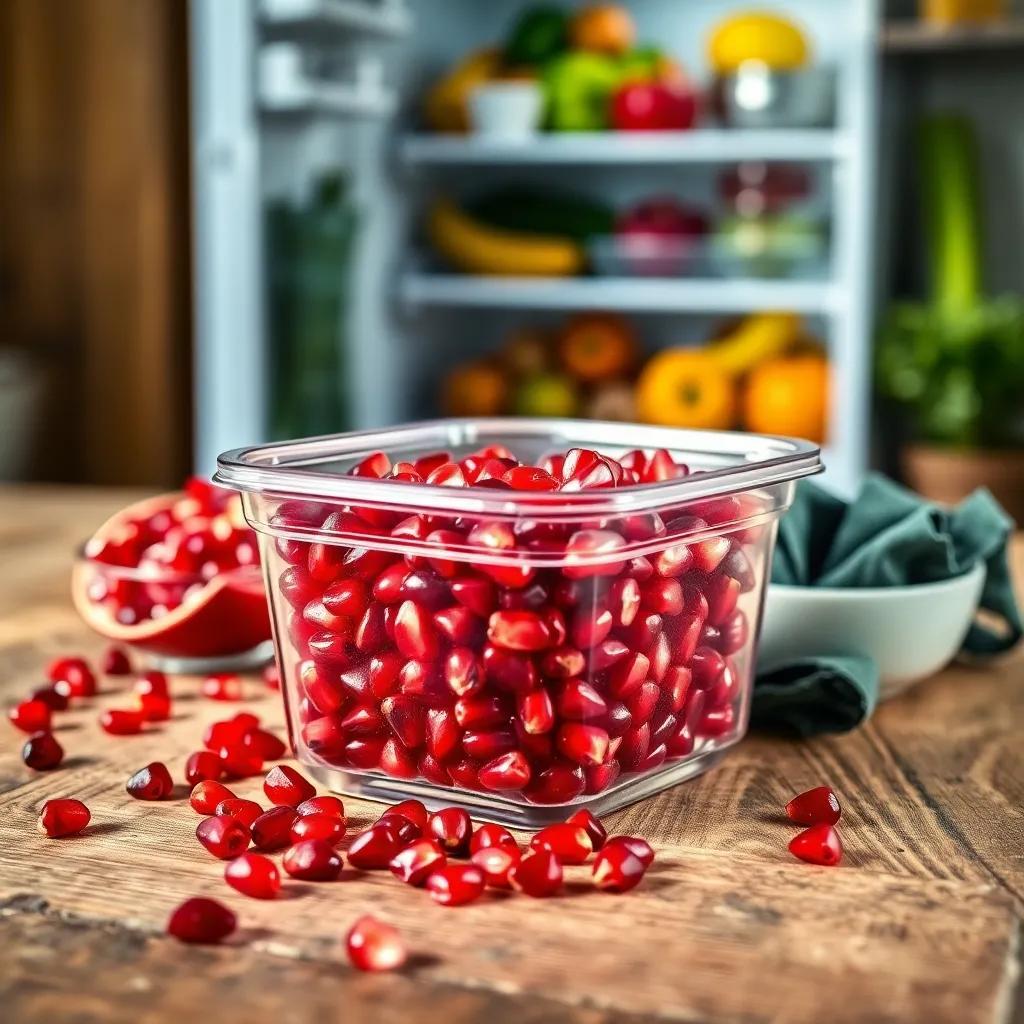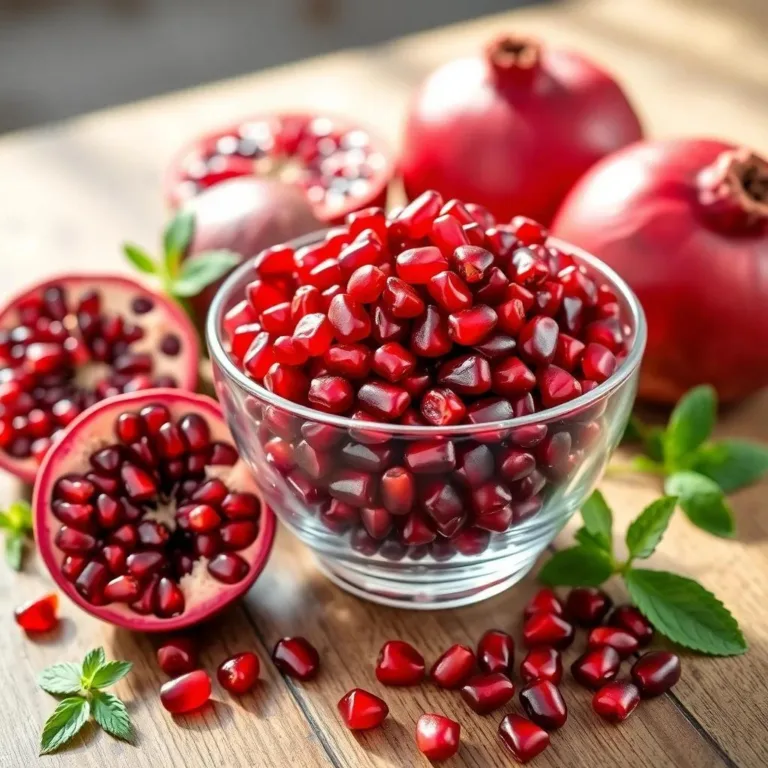Have you ever wondered how to tell if those delicious pomegranate seeds are still good to eat? I’ve been there, standing in the kitchen, unsure whether to toss them or enjoy their juicy goodness! In this article, I’ll share my tips for identifying spoiled seeds, how to store them properly, and some fun facts that’ll keep you safe and informed. Let’s dive in and make sure every bite is a burst of flavor!
Signs of Spoilage in Pomegranate Seeds
When it comes to pomegranate seeds, nobody wants to bite into a bad one! It’s key to recognize the signs that indicate your seeds have gone bad. Here are some telltale signs you should look out for:
- Mold or Mildew: If you see any fuzzy spots or strange colors on your seeds, it’s time to toss them! Mold can be sneaky and might not always be obvious, so keep your eyes peeled.
- Unpleasant Odor: Fresh pomegranate seeds smell sweet and slightly tangy. If your seeds smell sour, musty, or just plain yucky, they’re no good! Trust your nose; it knows!
- Slimy Texture: Fresh seeds should feel firm and juicy. If they have a slimy or mushy texture, that’s a big red flag! Toss them in the trash and avoid a nasty surprise!
- Discoloration: Healthy seeds showcase a vibrant, deep red color. If you notice them turning brown or black, it often means they are past their prime. Freshness is key to taste and nutrition!
- Off-putting Taste: Lastly, if you sample a seed and it tastes weird or sour, don’t risk it! Fresh seeds have a sweet and slightly tart flavor, so anything different should raise alarms.
Being aware of these signs can help you enjoy your pomegranate seeds to the fullest! Who wants to ruin a delicious smoothie or salad by adding spoiled seeds? Not me! So, keep an eye out and savor the deliciousness of fresh pomegranate seeds!
Proper Storage Techniques for Pomegranate Seeds
Now that we know what to watch out for, let’s chat about how to store pomegranate seeds properly! Keeping your seeds fresh can be super simple with the right techniques. Here’s how to keep those ruby-red jewels in tip-top shape:
- Refrigeration: After you remove the seeds from their fruit, place them in an airtight container or a resealable bag. This helps keep them fresh in the fridge for about 5 to 7 days. Try not to let them sit out too long; they’re not fans of warmth!
- Avoid Moisture: Moisture is the enemy! Make sure your storage container is completely dry before adding your seeds. You can also place a paper towel at the bottom to soak up any extra moisture. This trick helps to keep them from getting slimy.
- Freezing: Got too many seeds to eat right away? No problem! Spread them out on a baking sheet, freeze until solid, and then transfer them to a freezer-safe bag. They can last up to 6 months in the freezer! Just remember to label your bags with the date, so you know how long they’ve been chillin’!
- Utilization: Incorporate pomegranate seeds into your favorite dishes! Add them to smoothies, salads, or yogurt. When you regularly use your seeds, they’re less likely to sit around and go bad.
With these easy storage techniques, you can enjoy the delightful taste and nutritional benefits of pomegranate seeds longer! It’s all about keeping them happy so they can bring joy to your meals!

How to Identify Fresh Pomegranate Seeds
Choosing fresh pomegranate seeds is like finding hidden gems in your kitchen! Nobody wants to bite into something rotten, right? So let’s talk about how to spot the good ones! Here’s what to keep an eye on:
- Color: Fresh pomegranate seeds are bright, vivid red—think of a ruby! If they look dull or have a brownish hue, they aren’t at their best. Vibrant color usually means tasty flavor!
- Texture: When you press a fresh seed, it should feel firm and juicy—not mushy or slimy. If they feel soft, that’s a sign they might be past their prime. I mean, who wants squishy seeds in their salad?
- Smell: Fresh seeds have a sweet and slightly tangy aroma. If they smell musty, sour, or anything off, trust me, you don’t want to eat those!
- Taste Test: If you’re ever in doubt, a small taste test can save the day! A fresh seed bursts with sweet and slightly tart flavor. If it tastes weird, don’t finish it!
With these tips in your pocket, you’ll be a pro at picking out fresh pomegranate seeds. Enjoy their wonderful crunch and bright flavor in your dishes!
Common Misconceptions About Pomegranate Seed Freshness
I’ve heard a few misconceptions about pomegranate seeds that might confuse some of us. Let’s clear the air, shall we? Here are a few beliefs that often get passed around:
- “All red seeds are fresh.” Not true! While vibrant red usually indicates freshness, it’s not the only factor. Always check for texture and smell, too!
- “Pomegranate seeds last forever in the fridge.” Sadly, that’s a myth! Although refrigeration helps, seeds typically only stay fresh for about a week. If they start to look or smell bad, get rid of them!
- “Frozen seeds lose their nutrients.” Nope! Freezing pomegranate seeds preserves their taste and nutrients! If you have leftovers, popping them in the freezer is a great option.
- “Brown seeds are toxic.” While brown seeds might not taste the best, they aren’t dangerous. However, they do indicate over-ripeness, and fresh seeds will always be a better choice.
Let’s bust these myths together! Knowing the truth will help you choose and enjoy pomegranate seeds like a champ!
Health Risks of Consuming Bad Pomegranate Seeds
Eating bad pomegranate seeds isn’t just a bummer; it can actually pose some health risks! Nobody wants a tummy ache after enjoying a healthy snack, so let’s dive into this topic!
- Food Poisoning: When seeds go bad, they can harbor harmful bacteria. Consuming spoiled seeds might lead to food poisoning, which can cause nausea, vomiting, and diarrhea. Yikes! This is definitely a party nobody wants to attend!
- Allergic Reactions: If you have sensitivities, eating spoiled food can trigger allergic reactions or food intolerances. It’s always best to play it safe and avoid eating anything that looks or smells off.
- Digestive Issues: Even if you don’t experience food poisoning, eating old pomegranate seeds can lead to tummy troubles. Bloating or discomfort might occur if your stomach isn’t happy with the food choices you made.
So, what’s the takeaway here? Always check for freshness! Trust your instincts, use your senses, and if something seems fishy, toss it out! Instead of risking your health, enjoy the delightful flavor and benefits of fresh pomegranate seeds! Your body will thank you!

